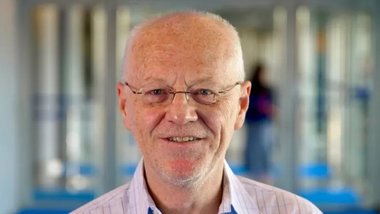25 March 2021
Prof Peter Goadsby [pictured below], from King’s Health Partners Neurosciences and winner of the world’s largest prize for brain research, describes how recognition for migraine research can help the one billion people worldwide who suffer from severe headaches.
Prof Peter Goadsby, please tell us about yourself and role at King’s Health Partners.
I am a neurologist in the field of headache and migraine. I joined the department of Basic and Clinical Neuroscience at King’s College London’s Institute of Psychiatry, Psychology & Neuroscience in 2013. I am Director at the National Institute for Health Research (NIHR)-Wellcome Trust Clinical Research Facility (CRF) at King’s College London. I am also the pain research theme lead at the NIHR Maudsley Biomedical Research Centre (BRC) and act as an honorary consultant neurologist at King’s College Hospital and Great Ormond Street NHS Foundation Trusts.
Since we last spoke to you about your pioneering migraine research in April 2019, can you tell us how your work has progressed?
Migraine is one of the most common neurological conditions that affects the world’s population. Not only do people with this condition suffer from severe headache and throbbing pain, but may also experience nausea, vomiting and increased sensitivity to light and sound.
In the late 1980’s, Prof Lars Edvinsson, Professor of Medicine at the University of Lund, Sweden and I explored the role of calcitonin gene-related peptide (CGRP) in the neurobiology of migraine. Cerebral nerves and blood vessels release substances including CGRP during migraine attacks. During experiments we found that an electrical activation of the trigeminal nerve – an essential pathway for migraine – leads to an increase of GCRP in blood. Based on our studies, several medicinal approaches that interact with this pathway have been developed and some have since been approved for use by the National Institute for Health and Care Excellence (NICE) and international health regulators.
Initial developments focused on creating the drug - Erenumab – to block the action of CGRP receptors. The drug Erenumab has since recently approved by NICE for preventing migraine.
In March 2020, Fremanezumab was approved by NICE to treat chronic migraine within the NHS in England and Wales. Galcanezumab, another medicine we recommended for preventing migraine, was also approved by NICE in November 2020.
Other medicinal approaches have been licensed for use in the US, specifically rimegepant and ubrogepant, which we will hopefully also see soon in Europe.
What does receiving the Brain Prize - the world’s largest prize for brain research – mean to you?
It is an enormous privilege to receive the Brain Prize. It gives profound recognition for the fields of headache and migraine and demonstrates that the study of migraine and its neurobiology has gone mainstream. It is really a prize for all the people who have suffered for so long with headache disorders, and for all the excellent scientists who have made an important contribution to this field. The Brain Prize is an overdue recognition of the ‘Cinderella’ problem of migraine. Cinderella has arrived at the ball as a welcome guest - and got the glass slipper!
It is great to receive a prize alongside my colleagues which will be incredibly useful to patients by improving pathways of care. I feel privileged to work in medicine with patients’ headache disorders, and their families, to make some small differences and help the incredibly brave patients I see do just a little better.
A prize like this also allows us at King’s Health Partners Neurosciences to build on the strengths of our programmes to facilitate research into migraine.
It is also important to mention that the reason our research has been successful is because of excellent working relationship with patient groups at the Migraine Trust - a patient focused, research driven UK charity.
What impact has your study had on improving outcomes for patients in south east London and beyond, and how do you see this impact growing in the future?
Slightly more than one billion people in the world suffer from migraine. Each day, on overage, three million of them will be having a migraine. If you are sitting on a bus, for example, one in three adult females on that bus, on average, will suffer with migraine.
It is a very common condition. Migraine is a disorder that hides because it does not have an obvious manifestation. Recognition for migraine research through the Brain Prize adds to and legitimises a condition that exists all over the world.
What role has King’s Health Partners played in facilitating your research or supporting your work?
King’s Health Partners Neurosciences provides a collaborative environment to work across south London on common disabling neurological problems. King’s Health Partners recognises that neurosciences is one of its areas of strength and that our research expertise offers a tangible way for the partnership to deliver on its mission, in terms of research, education and local care.
It is also incredibly important to recognise King’s Health Partners Neurosciences strong research relationships with the NIHR Maudsley BRC - one of the linchpins to advance our missions in the field of neuroscience excellence.
We are using our collective expertise to become a global top ten Neurosciences Institute. We deliver outstanding research and education, and drive excellence in care and equity for patients with neurological conditions.
Liked this article? Read top global prize for brain research.





